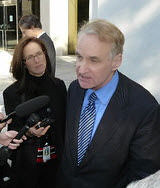UK leader fires interior minister and brings ex-leader Cameron back to government in surprise move
Coffey #Coffey

Cameron’s appointment came as a surprise to seasoned politics-watchers. It’s rare for a non-lawmaker to take a senior government post, and it has been decades since a former prime minister held a Cabinet job.
The government said Cameron was being appointed to Parliament’s unelected upper chamber, the House of Lords. The last foreign secretary to serve in the Lords, rather than the elected House of Commons, was Peter Carrington, who was part of Prime Minister Margaret Thatcher’s government in the 1980s.
Cameron, 57, said Britain was “facing a daunting set of international challenges, including the war in Ukraine and the crisis in the Middle East.”
“While I have been out of front-line politics for the last seven years, I hope that my experience — as Conservative leader for 11 years and prime minister for six — will assist me in helping the prime minister to meet these vital challenges,” he said in a statement.
Cameron’s appointment brings back to government a leader brought down by Britain’s decision to leave the European Union. Cameron called the 2016 EU membership referendum, confident the country would vote to stay in the bloc. He resigned the day after voters opted to leave.
Sunak was a strong backer of the winning “leave” side in the referendum. Cameron’s return, and Braverman’s sacking, are likely to infuriate the Conservative Party’s right wing and inflame tensions in the party that Sunak has sought to soothe.
Prominent right-wing lawmaker Jacob Rees-Mogg said sacking Braverman was “a mistake, because Suella understood what the British voter thought and was trying to do something about it.”
Sunak had been under growing pressure to fire Braverman — a hard-liner popular with the party’s authoritarian wing — from one of the most senior jobs in government, responsible for handling immigration and policing.
In a highly unusual attack on the police last week, Braverman said London’s police force was ignoring lawbreaking by “pro-Palestinian mobs.” She described demonstrators calling for a cease-fire in Gaza as “hate marchers.”
On Saturday, far-right protesters scuffled with police and tried to confront a large pro-Palestinian march by hundreds of thousands through the streets of London. Critics accused Braverman of helping to inflame tensions.
Last week Braverman wrote an article for the Times of London in which she said police “play favorites when it comes to protesters” and acted more leniently toward pro-Palestinian demonstrators and Black Lives Matter supporters than toward right-wing protesters or soccer hooligans.
The article was not approved in advance by the prime minister’s office, as would usually be the case.
Braverman said Monday that “it has been the greatest privilege of my life to serve as home secretary,” adding that she would “have more to say in due course.”
Braverman, a 43-year-old lawyer, has become a leader of the party’s populist wing by advocating ever-tougher curbs on migration and a war on human rights protections, liberal social values and what she has called the “tofu-eating wokerati.” Last month she called migration a “hurricane” that would bring “millions more immigrants to these shores, uncontrolled and unmanageable.”
As home secretary Braverman championed the government’s stalled plan to send asylum-seekers who arrive in Britain in boats on a one-way trip to Rwanda. A U.K. Supreme Court ruling on whether the policy is legal is due on Wednesday.
Critics say Braverman has been building her profile to position herself for a party leadership contest that could come if the Conservatives lose power in an election expected next year.
The bold changes are an attempt by Sunak to reset his faltering government. The Conservatives have been in power for 13 years, but opinion polls for months have put them 15 to 20 points behind the opposition Labour Party amid a stagnating economy, persistently high inflation, an overstretched health care system and a wave of public sector strikes.
Last month Sunak tried to paint his government as a force of change, saying he would break the “30-year status quo” that includes the governments of Cameron and other Conservative predecessors.
“A few weeks ago, Rishi Sunak said David Cameron was part of a failed status quo. Now he’s bringing him back as his life raft,” said Labour lawmaker Pat McFadden.
As well as bringing about Brexit, Cameron’s government imposed years of public-spending cuts after the 2008 global financial crisis that have frayed the country’s welfare system and state-funded health service. After leaving office he was caught up in a scandal over his lobbying for Greensill Capital, a financial services firm that later collapsed.
Tim Bale, professor of politics at Queen Mary University of London, said Cameron’s appointment “is a measure of the desperation that surrounds this government.”
“It’s difficult to believe that this is going to impress voters, whether they are convinced Brexiteers who despise David Cameron for being a remainer, or convinced remainers who despise David Cameron for holding and losing a referendum,” he said.
“On the upside, it’s a useful distraction from Braverman’s sacking, and as a former prime minister it will mean that the U.K. has rather more clout in international circles than perhaps might have been the case.”